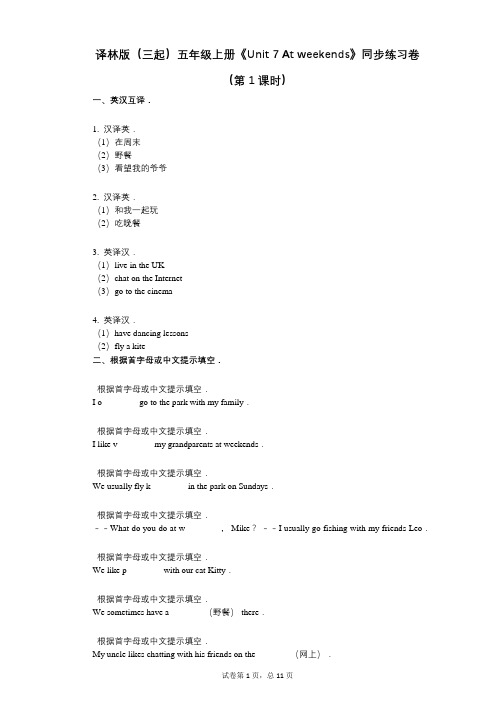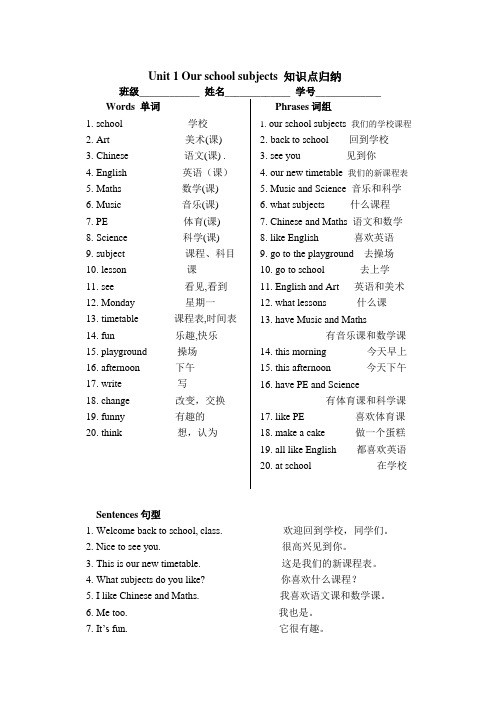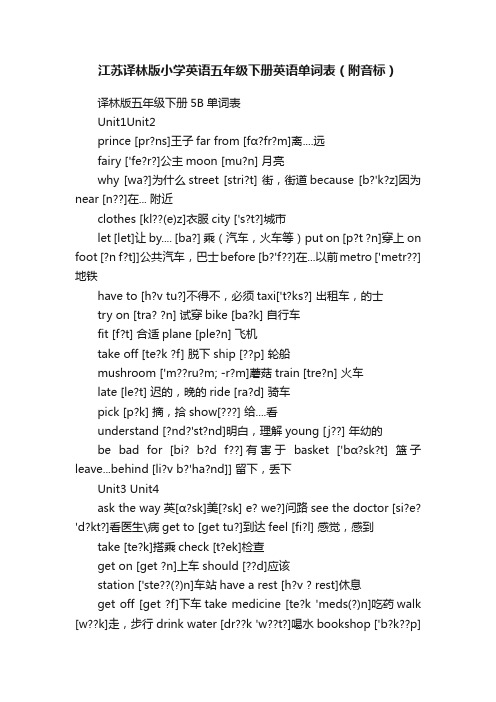译林版小学英语4BUnit7_my 3
完整版个人精心制作新译林英语4BUNIT7单元知识点整理及单元练习题

新译林英语4BUNIT7 单元知识点整理及单元练习题Unit7What ’sthematter?〔1〕一、复习比拼1、来吃个派comeandhaveapie(翻译时注意动词是几个〕去打乒乓球____and_____the_____________.去画一些图片______and_______some_________.来看一看comeand________________.2、饥饿的:______口渴的:______疲惫的:______生病的:______伤心的:______反:以上词都是〔〕,所以在此类词前面要加上〔〕。
例如:我不饿: ______我口渴:______你生病了:______我很累:______3、我能喝些水吗?CanI___________water?〔一般疑问句中 some要改为______,这里也是一样吗?为什么?你还能就哪些例子,写在下面〕4、怎么了?What’sthematter?=What’s_______?你怎么了?5、我想睡觉Iwanttogotobed.想做...事情wanttodo...想要...东西want+名词想去看电视:____想要一个苹果派:____6、给你Hereyouare.7、这有一些水Here’ssomewater.=Hereissomewater.(不可数名词如水、果汁等前面用___〕例如:这有一些果汁:这有一面扇子Here’sa_____.这有一个热狗Here’sahot dog.8、以一种不同的方式:inadifferentway〔反〕以相同的方式:9、我是狐狸夫人〔用语〕:ThisisM___Fox___________.(跟别人打的时候是现在正在讲话,所以时态要用现在进行时〕例如,你跟别人打时,你怎样介绍你自己:10、你还好吗?Areyouallright? Allright:11、吃个蛋糕haveacake.=eatacake喝一些水_____somewaterHave有吃、喝的意思12、他现在快乐了He’shappynow.*some在疑问句中的用法:在一般疑问句中,some要改为any,但是在有些情况中,some却没有改变,这是为什么呢?表示请求的疑问句CanIhavesomeorangejuice,please?我能喝些果汁吗?MayIaskyousomequestions?我可以问你一些问题吗?表示建议的疑问句Shallwehavesomepiesforrice?我们晚饭吃些馅饼好吗?Howaboutsomenoodles?来些面条怎么样?表示反问的疑问句Can’tyouseesomegrassoverthere?你难道看不见那边的草吗?④表示说话希望得到肯定答复的疑问句Canyouseesomebirdsinthetree?你能看见树上有些鸟吗?二、音标1、读一读:gohomenoseclosenoopen2、想一想:gohomenoseclosenoopenUnit7What ’sthematter?〔2〕一、语音o /??/closehomenonoseopenoldsogocold绕口令Gohome,Joe,andshowRoseyournose!1.二、词汇haveapie吃个派somewater一些水Hereyouare.给你。
译林版四年级英语上册 Unit7 第3课时 教学课件PPT小学公开课

Unit 7 How much Sound time & song time & Checkout time & Ticking time译林版英语四年级(上)Warming up play a game 看到水果说cut , 然后大声读出水 果切开后里面包 含的单词!Let’s reviewLet’s play!twentyt h i r t ys h o ef a nr e l l a u m bf i f t yonlyfortyyuantailI ha v e fi v estickers.stickersMy mother gi v esme a pair of glo v es.glo v esHow many people are there?There arefi v e men.What are they doing?They areswimming inthe ri v er.Fi v e men li v e near the ri v er. They lo v e to swim in summer.Can you find the rules in these words?gi v e 给fi v e 五li v e 居住lo v e 喜爱v ery很,非常Let's learn Read after me① 它们都含有字母“v ”② 字母“v ”在这些单词中发/v/音你们发现了吗?fi v e 五lo v e 喜爱gi v e 给li v e 居住v ery 很,非常se v en lo v ely ele v en ha v e e v ery twel v e e v ening ri v er Let’s summary/v/上齿轻轻接触下唇,然后吹气,使气流从 齿间通过形成摩擦,声带振动。
你能写出更多类似单词吗?V icky, V icky!Ha v e some juice!And gi v e me a nicecake !Let’s chantWhat clothes can you see in this video?We can see blue skirts and T-shirts, yellow shoes and red socks.You can buy them all. Ha! Ha!try on试穿Listen and fillBlue _s _k _i r _t _s a nd _T _-_s _h _i r _t _s , 便y e 宜l lo 的w _s _h o _e _s _and red _s _o _c _k _s . They are very cheap andthey are very _g o _o _d _! You cantry them on.skirts and T-shirts,shoes and socks. They are veryand they are very ! You can try them on. You can buy them all…Let’s make a rhyme 想一想,填一填唱一唱自己编写的歌谣,看看谁唱得最好。
四年级下册英语说课稿-Unit7 What’s the matter Story time译林版(三

四年级下册英语说课稿-Unit7 What’s the matter Story time译林版(三起)一、教材分析本次课程教材为译林版(三起)四年级下册英语第七单元的Story time部分,该部分共有两篇故事:A bad tooth和A cold。
本单元是学习谈论身体不适的单元,通过学习句型“What’s the matter?”和“Are you OK?”,掌握如何询问和回答别人的身体状况。
二、教学目标1.能够听懂并正确朗读两篇Story time故事;2.能够运用“What’s the matter?”和“Are you OK?”这两个句型询问他人身体状况;3.能够正确描述身体不适的原因和相应症状。
三、教学重点难点重点1.运用“What’s the matter?”句型询问他人身体状况;2.正确描述身体不适的原因和相应症状。
难点1.正确运用“What’s the matter?”和“Are you OK?”这两个句型;2.正确描述身体不适的原因和相应症状。
四、教学策略方法1.情境教学法:通过学习故事情境,让学生在真实情景中理解并掌握语言表达;2.任务型教学法:通过分组活动和小组合作,培养学生的口语交际能力;3.归纳总结法:通过教师提供案例,引导学生归纳概括重要知识点和语言表达。
五、教学步骤与内容1. Warming-up自我介绍并询问学生身体状况。
T:Hi, boys and girls. How are you today?Ss:Fine, thank you. And you?T:I’m fine, too. Do you have any problem today?S1:My stomach hurts.S2:I have a headache.T: (点头示意) Let’s learn how to ask and answer “What’s the matter?”.2. Pre-reading1.Show pictures of two characters and ask students to guess what’s wrong with them.T:Do you know who they are? What’s wrong with them?[A picture of a boy holding his face with one hand and a picture of a girl wearing a scarf and a hat.]Ss:He has a toothache and she has a cold.T:Yes, that’s right. Let’s read the story and find out how they got the toothache and cold.2.Ask students to read the story silently and answer some questions.T:Please read the story silently and answer the following questions.a.What did Ben eat?b.Why did Ben have a toothache?c.How did Lucy get a cold?3. While-reading1.Play the recording to let students listen to the story.2.Ask students to read the story aloud.3.Correct their pronunciation and intonation.4.Repeat the steps above for the other story.4. Post-reading1.Ask students to work in groups to describe the symptoms of a certain disease.T:Please work in groups of four. Each group decides a disease to describe. For example, cough, fever, headache, toothache, stomachache,etc. One student describes the symptoms of the disease, and others guess what it is. Ready? Go!2.Show some pictures to let students describe the symptoms of the diseases.5. Summary and Homework1.Summarize what students learned today.2.Ask students to make some sentences using “What’s thematter?”and “Are you OK?”.3.Assign homework: Read the two stories in English five times.六、教学反思本次课程采用了情境教学法、任务型教学法和归纳总结法结合的教学策略方法,可以提高学生的口语表达能力和语言交际能力。
译林版(三起)五年级上册《Unit_7》小学英语-有答案-同步练习卷(第1课时)

译林版(三起)五年级上册《Unit 7 At weekends》同步练习卷(第1课时)一、英汉互译.1. 汉译英.(1)在周末________(2)野餐________(3)看望我的爷爷________2. 汉译英.(1)和我一起玩________(2)吃晚餐________3. 英译汉.(1)live in the UK________(2)chat on the Internet________(3)go to the cinema________4. 英译汉.(1)have dancing lessons________(2)fly a kite________二、根据首字母或中文提示填空.根据首字母或中文提示填空.I o________ go to the park with my family.根据首字母或中文提示填空.I like v________ my grandparents at weekends.根据首字母或中文提示填空.We usually fly k________ in the park on Sundays.根据首字母或中文提示填空.﹣﹣What do you do at w________, Mike?﹣﹣I usually go fishing with my friends Leo.根据首字母或中文提示填空.We like p________ with our cat Kitty.根据首字母或中文提示填空.We sometimes have a________(野餐) there.根据首字母或中文提示填空.My uncle likes chatting with his friends on the________(网上).根据首字母或中文提示填空.﹣﹣Do you have swimming________(课程)?﹣﹣Yes, I do.三、单项选择.Wang Bing likes ________ with his e﹣friend Susan on the Internet.()A.chatB.chattingC.chatsWe often have dinner ________ our parents at weekends.()A.inB.onC.with﹣﹣What ________ Helen ________ at weekends?﹣﹣She always goes to the cinema with Lucy.()A.do; doB.does; doC.do; does﹣﹣What do you do at weekends, Lucy?﹣﹣I often go ________.()A.swimmingB.swimC.swimsLiu Tao always has ________ on Sundays.()A.dancing lessonB.dance lessonsC.dancing lessonsMy grandparents ________ the UK.() A.lives B.live in C.lives in四、按要求改写句子.按要求改写句子.I usually ________ at weekends.(对画线部分提问)________ you usually________ at weekends?按要求改写句子.My grandparents live ________.(对画线部分提问)________ your grandparents________?按要求改写句子.We play football with our classmates at weekends.(改为否定句)We________ football with our classmates at weekends.按要求改写句子.Jean sometimes goes to the cinema with her friends.(改为一般疑问句)________ Jean sometimes________ to the cinema with her friends?按要求改写句子.My brother likes flying a kite in the park on Saturdays.(改为否定句)My brother________ a kite in the park on Saturdays.五、根据所给情境,补全对话.根据所给情境,补全对话.A:What (1)________ you(2)________ at weekends, Mike?B:I usually (3)________ my grandparents. I like playing(4)________ their cat Kitty. That's funny.A:Oh, my grandparents (5)________ in the UK. I usually(6)________ with them on the (7)________at weekends.B:I think that's great.A:What (8)________ Lucy (9)________ at weekends?B:She always has singing (10)________ at weekends. And she sometimes has a picnic (11)________her friends.六、从II栏中选出与I栏相对应的答句.从II栏中选出与I栏相对应的答句.A.Yes, I do.2.Do you often play basketball at weekends? AB.He lives in the countryside.3.Who's your e﹣friend, Su Yang? EC.She often chats with her e﹣friend Su Hai on the Internet.4.Where does your grandpa live? BD.I usually go to the cinema with my family.5.What does Nancy do at weekends? CE.Lily.参考答案与试题解析译林版(三起)五年级上册《Unit 7 At weekends》同步练习卷(第1课时)一、英汉互译.1.【答案】on the weekend,picnic,visit my grandfather【考点】翻译能力单词、词组【解析】(1)on the weekends(2)picnic(3)visit my grandfather【解答】本题考查短语翻译和单词翻译.(1)on the weekend.在周末on the weekend.故答案为:on the weekend.(2)picnic.野餐picnic.故答案为:picnic.(3)visit my grandfather.看望我的爷爷visit my grandfather.故答案为:visit my grandfather.2.【答案】play with me,have dinner【考点】翻译能力【解析】(1)play with me.(2)have dinner.【解答】本题考查短语翻译.(1)play with me.和我一起玩play with me.介词后用代词的宾格me.故答案为:play with me.(2)have dinner.吃晚餐have dinner.故答案为:have dinner.3.【答案】住在英国,在网上聊天,去电影院【考点】翻译能力【解析】(1)住在英国.(2)在网上聊天.(3)去电影院.【解答】本题考查短语翻译.(1)住在英国.live in the UK住在英国.故答案为:住在英国.(2)在网上聊天.chat on the Internet在网上聊天.故答案为:在网上聊天.(3)去电影院.go to the cinema去电影院.故答案为:去电影院.4.【答案】上舞蹈课,放风筝【考点】翻译能力【解析】(1)上舞蹈课(2)放风筝【解答】本题考查短语翻译.(1)上舞蹈课.have dancing lessons上舞蹈课.故答案为:上舞蹈课.(2)放风筝.fly a kite放风筝.故答案为:放风筝.二、根据首字母或中文提示填空.【答案】ften【考点】单词、词组【解析】我经常和家人一起去公园.【解答】考查单词填空.根据题干:这里表示经常,以o开头应该是often.故答案为:often.【答案】isiting【考点】单词、词组【解析】我喜欢周末去看望我的祖父母.【解答】考查单词填空.根据题干:从my grandparents at weekends,判断首字母以v开头应该是visit,like doing sth表示喜欢做某事.故答案为:visiting.【答案】ites【考点】单词、词组【解析】星期天我们通常在公园放风筝.【解答】考查单词填空.根据题干:这里表示放风筝,以k开头应该是kite,名词,风筝,应该用复数形式.故答案为:kites.【答案】eekends【考点】单词、词组【解析】﹣﹣你周末做什么,迈克?﹣﹣我通常和我的朋友利奥去钓鱼.【解答】考查单词填空.根据题干:从I usually go fishing with my friends Leo,以w开头应该是weekend,名词,周末,at weekends表示在周末.故答案为:weekends.【答案】laying【考点】单词、词组【解析】我们喜欢和小猫玩.【解答】考查单词填空.根据题干:like doing sth表示喜欢做某事,以p开头应该是play,play with表示与…玩耍.故答案为:playing.【答案】picnic【考点】翻译能力【解析】我们有时在那里野餐.【解答】考查翻译填空.题中,野餐翻译成picnic,放在a后面跟名词单数形式picnic.故答案为:picnic.【答案】Internet【考点】翻译能力【解析】我叔叔喜欢和他的朋友在网上聊天.【解答】考查翻译填空."网络"翻译成Internet,on the Internet表示在网上,固定搭配.故答案为:Internet.【答案】lessons【考点】【解析】﹣﹣你上游泳课吗?﹣﹣是的,上.【解答】考查翻译填空.题中,课程翻译成lesson,swimming lessons表示游泳课,这里用复数形式.故答案为:lessons.三、单项选择.【答案】B【考点】动名词【解析】王兵喜欢在网上和他的网友Susan聊天.【解答】考查动名词.由题,句中使用like表示喜欢做某事,其后搭配的动词要用动名词形式,chat的动名词形式为chatting.故选:B.【答案】C【考点】介词【解析】在周末我们经常和我们的父母吃晚饭.【解答】考查介词的辨析.由题,A、B为时间或位置介词,C为"和……一起",C选项代入句意为"在周末我们经常和我们的父母吃晚饭."符合逻辑.故选:C.【答案】B【考点】特殊疑问句【解析】﹣﹣在周末Helen做什么?﹣﹣她总是和Lucy去电影院.【解答】考查特殊疑问句.由题,问句主语Helen为第三人称单数,疑问词what后的助动词要用第三人称单数形式does,助动词后的实义动词要用原形形式,即do.故选:B.【答案】A【考点】动名词【解析】﹣﹣Lucy,你周末做什么?﹣﹣我经常去游泳.考查动名词.由题,问句在询问Lucy在周末常做什么,答句表示"去游泳"要固定搭配go swimming.故选:A.【答案】C【考点】动词短语【解析】刘涛星期天总是上舞蹈课.【解答】考查短语.上…课是have…class,舞蹈课,即dancing class,由always,可知舞蹈课不止一节,为复数形式.故选:C.【答案】B【考点】动词短语动词原形【解析】我的祖父母住在英国.【解答】考查动词短语、动词原形.由题,句中主语grandparents为复数形式,其后可以搭配动词的原形而不能搭配第三人称单数形式,故A、C选项不符;表示"在英国"要搭配介词in.故选:B.四、按要求改写句子.【答案】chat with my friends on the Internet,What do,do【考点】就划线部分提问【解析】我周末通常和朋友在网上聊天.你周末通常做什么?【解答】考查特殊疑问句.特殊疑问句的结构:特殊疑问词+一般疑问句.句子的划线部分是chat with my friends on the Internet,是做事情,询问什么,确定疑问词为What,句子的剩余部分变成一般疑问句跟在后面,句子中有谓语动词原形chat,变一般疑问句用助动词do引导,I变为you.用What do you usually do at weekends?提问.故答案为:What do,do.【答案】in the US,Where do,live【考点】就划线部分提问我的祖父母住在美国.你的祖父母住在哪里?【解答】考查特殊疑问句.特殊疑问句的结构:特殊疑问词+一般疑问句.句子的划线部分是in the US,是地点,询问在哪,确定疑问词为Where,句子的剩余部分变成一般疑问句跟在后面,句子中有谓语动词原形live,变一般疑问句用助动词do引导,My变为your.用Where do your grandparents live?提问.故答案为:Where do,live.【答案】don't play【考点】肯定句转否定句【解析】我们周末和同学一起踢足球.我们周末不和同学一起踢足球.【解答】考查肯定句转否定句.原句是一般现在时的陈述句,句子中有谓语动词原形play,变否定句用助动词do,其后加not即可,do not可缩写为don't,放于主语后,动词原形前,其余部分顺序不变.原句变为的否定句为:We don't play football with our classmates at weekends.故答案为:don't play.【答案】Does,go【考点】一般疑问句【解析】简有时和她的朋友一起去看电影.简有时和她的朋友一起去看电影吗?【解答】考查一般疑问句.原句是一般现在时的陈述句,句子中有谓语动词的第三人称单数goes,变一般疑问句用助动词Does引导,放于句首,其余部分按顺序放在Does后,goes变为go,句末加问号.原句变为的一般疑问句就是:Does Jean sometimes go to the cinema with her friends?故答案为:Does,go.【答案】doesn't like flying【考点】肯定句转否定句【解析】我弟弟喜欢周六在公园里放风筝.我弟弟不喜欢周六在公园里放风筝.【解答】考查肯定句转否定句.原句是一般现在时的陈述句,句子中谓语动词是第三人称单数likes,变否定句用助动词does,其后加not即可,does not可缩写为doesn't,放于主语后,动词原形前,likes还原为like,其余部分顺序不变.原句变为的否定句为:My brother doesn't like flying a kite in the park on Saturdays.故答案为:doesn't like flying.五、根据所给情境,补全对话.【答案】do,do,visit,with,live,chat,Internet,does,do,lessons,with【考点】补全对话【解析】A:迈克,你在周末做什么?B:我通常拜访我的祖父母.我喜欢和他们的猫凯蒂玩.很有趣.A:哦,我的爷爷奶奶住在英国.我通常在周末在网上和他们聊天.B:我认为那很不错.A:露西在周末做什么呢?B:她总是在周末上声乐课.有时候她会和她的朋友们进行一次野餐.【解答】考查补全对话.(1)do.考查助动词.对话用一般现在时,主语是you第二人称,句中有实意动词,助动词用do.故填:do.(2)do.考查动词.助动词do后面跟动词原形do"做",询问做什么.故填:do.(3)visit.考查动词.由题,I是第一人称单数,谓语动词用原形,visit拜访,符合题意.故填:visit.(4)with.考查介词.play with是固定搭配,译为:与…一起玩耍,符合题意.故填:with.(5)live.考查动词.in the UK在英国,根据后文可知,会与爷爷奶奶在晚上聊天,所以,他们应该住在英国,主语是复数,谓语动词用原形live.故填:live.(6)chat.考查动词.chat with them与他们聊天,符合题意语境.主语是I,谓语动词用原形chat.故填:chat.(7)Internet.考查名词.on the Internet在网上,固定搭配,符合题意语境.故填:Internet.(8)does.考查助动词.主语是第三人称单数,句中有实意动词,助动词用does.故填:does.(9)do.考查动词.助动词does后面跟动词原形do"做",询问Lucy做什么.故填:do.(10)lessons.考查名词复数.singing lessons声乐课,这里用复数表示一类.故填:lessons.(11)with.考查介词.with与…一起,后面常跟人,用在这里符合题意.故填:with.六、从II栏中选出与I栏相对应的答句.【答案】D【考点】固定搭配【解析】1.苏海,你在周末做什么?我经常和我的朋友去电影院.2.你经常在周末打篮球吗?是的,我经常打.3.苏阳,你的网友是谁?Lily.4.你的爷爷住在哪里?他住在乡下.5.Nancy在周末做什么?她经常和她的网友苏海在网上聊天.【解答】1.D.考查特殊疑问句.问句意思为:苏海,你在周末做什么?答语回答苏阳做的事情.D选项意思为:我经常和我的朋友去电影院.符合句意.故选:D.2.A.考查一般疑问句.问句意思为:你经常在周末打篮球吗?用yes或者no作答.A选项意思为:是的,我经常打.符合句意.故选:A.3.E.考查特殊疑问句.问句意思为:苏阳,你的网友是谁?who提问人物.答语回答人物.E选项回答了人名Lily.符合句意.故选:E.4.B.考查特殊疑问句.问句意思为:你的爷爷住在哪里?where提问地址,答语回答地址.B选项意思为:他住在乡下.符合句意.故选:B.5.C.考查特殊疑问句.问句意思为:Nancy在周末做什么?答语回答做的事情.C 选项意思为:她经常和她的网友苏海在网上聊天.符合句意.故选:C.试卷第11页,总11页。
译林版小学英语小学四年级下册(4B)全册考点知识点归纳

Unit 1 Our school subjects 知识点归纳班级____________ 姓名_____________ 学号_____________Words 单词1. school 学校2. Art 美术(课)3. Chinese 语文(课) .4. English 英语(课)5. Maths 数学(课)6. Music 音乐(课)7. PE 体育(课)8. Science 科学(课)9. subject 课程、科目10. lesson 课11. see 看见,看到12. Monday 星期一13. timetable 课程表,时间表14. fun 乐趣,快乐15. playground 操场16. afternoon 下午17. write 写18. change 改变,交换19. funny 有趣的20. think 想,认为Phrases词组1.our school subjects 我们的学校课程2.back to school 回到学校3. see you 见到你4. our new timetable 我们的新课程表5. Music and Science 音乐和科学6. what subjects 什么课程7. Chinese and Maths 语文和数学8. like English 喜欢英语9. go to the playground 去操场10. go to school 去上学11. English and Art 英语和美术12. what lessons 什么课13. have Music and Maths有音乐课和数学课14. this morning 今天早上15. this afternoon 今天下午16. have PE and Science有体育课和科学课17. like PE 喜欢体育课18. make a cake 做一个蛋糕19. all like English 都喜欢英语20. at school 在学校Sentences句型1. Welcome back to school, class. 欢迎回到学校,同学们。
江苏译林版小学英语五年级下册英语单词表(附音标)

江苏译林版小学英语五年级下册英语单词表(附音标)译林版五年级下册5B单词表Unit1Unit2prince [pr?ns]王子far from [fɑ?fr?m]离....远fairy ['fe?r?]公主moon [mu?n] 月亮why [wa?]为什么street [stri?t] 街,街道because [b?'k?z]因为near [n??]在... 附近clothes [kl??(e)z]衣服city ['s?t?]城市let [let]让by.... [ba?] 乘(汽车,火车等)put on [p?t ?n]穿上on foot [?n f?t]]公共汽车,巴士before [b?'f??]在...以前metro ['metr??]地铁have to [h?v tu?]不得不,必须taxi['t?ks?] 出租车,的士try on [tra? ?n] 试穿bike [ba?k] 自行车fit [f?t] 合适plane [ple?n] 飞机take off [te?k ?f] 脱下ship [??p] 轮船mushroom ['m??ru?m; -r?m]蘑菇train [tre?n] 火车late [le?t] 迟的,晚的ride [ra?d] 骑车pick [p?k] 摘,拾show[] 给....看understand [?nd?'st?nd]明白,理解young [j??] 年幼的be bad for [bi? b?d f??]有害于basket ['bɑ?sk?t] 篮子leave...behind [li?v b?'ha?nd]] 留下,丢下Unit3 Unit4ask the way 英[ɑ?sk]美[?sk] e? we?]问路see the doctor [si?e? 'd?kt?]看医生\病get to [get tu?]到达feel [fi?l] 感觉,感到take [te?k]搭乘check [t?ek]检查get on [get ?n]上车should [??d]应该station ['ste??(?)n]车站have a rest [h?v ? rest]休息get off [get ?f]下车take medicine [te?k 'meds(?)n]吃药walk [w??k]走,步行drink water [dr??k 'w??t?]喝水bookshop ['b?k??p]书店toothache [tu?θe?k]牙疼next to.... [nekst tu?]在dentist ['dent?st]牙医sun [s?n]太阳anything ['en?θ??]任何东西ask...for help[ɑ?sk f??help] 向...求助brush one’s teeth [br?? w?ns ti?θ]刷牙excuse me [?k'skju?z mi?]劳驾,对不起bedtime ['bedta?m]就寝时间along [?'l??] 沿着,顺着giraffe [d??'rɑ?f; -'r?f] 长颈鹿turn right [t??n ra?t]向右转point at [p??nt ?t]指着,指向traffic light ['tr?f?k la?t]交通灯neck [nek] 脖子on your right [?n j?? ra?t]在你的右侧cinema ['s?n?m?; -mɑ?] 电影院hospital ['h?sp?t(?)l]医院shop [??p]商店zoo [zu?]动物园turn left [t??n left]向左转supermarket ['su?p?mɑ?k?t; 'sju?-]超市film [f?lm]电影stop [st?p]车站full [f?l]满的,饱的over ['??v?]结束了,完了Unit5 unit6parent ['pe?r(?)nt]父或母game [ge?m]运动,比赛clean [kli?n]擦,洗smell [smel]有...气味,闻起来cook [k?k]烧,煮meat [mi?t](猪、牛、羊等的)肉sweep the floor [swi?p e? fl??]扫地vegetable ['ved?t?b(?)l; 'ved??t?-] 蔬菜busy ['b?z?]忙,忙碌tomato [t?'mɑ?t??] 西红柿,番茄wash the dishes [w?? e? 'di?iz] 洗碗potato [p?'te?t??]马铃薯,土豆make the bed [me?k e? bed]整理床铺I can’t wait [a? k?nt we?t] 我等不及了!Grow [gr??]种植look for [l?k f??]找,寻找Garden ['gɑ?d(?)n]花园,果园ready ['red?] 准备好Sweet [swi?t]甜的yummy ['j?m?]好吃的,美味的Pest [pest]害虫love [l?v]喜欢,喜爱Ladybird ['led?b?:d]瓢虫bread [bred]面包Go away [g?? ?'we?]走了,离开win [w?n] 获胜,赢yeah [je?; je] 太好了,太棒了angry ['??gr?] 生气的,愤怒的spot [sp?t] 斑,点catch [k?t?] 抓,抓住drive...away [dra?v ?'we?] 赶走Unit7Unit8festival ['fest?v(?)l]节日birthday ['b??θde?] 生日Spring festival [spr?? 'fest?v(?)l]春节eleventh [?'lev(?)nθ]第十一Mid-autumn festival [mid-'??t?m 'fest?v(?)l]中秋节Fourth [f??θ]第四Dragon boat festival ['dr?g(?)n b??t 'fest?v(?)l]]端午节together [t?'gee?]一起Chinese new year[,t?ai'ni:z nju?j??]中国农历新年call [k??l]叫做,称作Double ninth festival ['d?b(?)l 'na?nθ 'fest?v(?)l]重阳节rice cake [ra?s ke?k]重阳糕January ['d??nj?(?)r?]一月game [ge?m] 游戏February ['febr??r?; 'febj??r?]二月place [ple?s]地点,地方March [mɑ?t?] 三月password ['pɑ?sw??d] 密码April ['eipr?l] 四月answer ['ɑ?ns?]答案May [me?]五月old [??ld]老的,年纪大的June [d?u:n]六月dumpling ['d?mpl??]饺子July [d??'la?]七月get together [get][t?'gee?]团聚August [??'g?st]八月rice dumpling [ra?s]['d?mpl??]粽子September [sep'temb?] 九月hero ['h??r??] 英雄October [?k't??b?]十月play [ple?]戏,戏剧November [n?(?)'vemb?]十一月dragon boat race ['dr?g(?)n b??t re?s]赛龙舟December [d?'semb?]十二月number ['n?mb?]数字,数start [stɑ?t]开始fight [fa?t] 打仗,打架moon cake [mu?n ke?k]月饼favorite ['fev?r?t]最喜欢的mountain 英['ma?nt?n]美['ma?ntn]山,山脉Mother’s Day ['m?e?z][de?] 母亲节Father’s day ['fɑ?e?z de?]]父亲节。
译林版三年级上册英语第七单元:Unit 7 Would you like a pie 一课一练(各课时)练习题sc
Unit 7 Would you like a pie?第一课时 Story time基础提优一、听录音,给下列图片排序。
() () ()() () ()二、听录音,给下列句子排序。
( ) Would you like a pie? ( ) What about a cake? ( ) Yes, please. ( ) Nice to meet you. ( ) No, Thank you.三、给下列英语选择相符的汉语。
( )1. ( )2.( )3.( )4.四、看图选择相应的单词。
( )A. sweetB. pieC. hot dogD. ice creamE. eggF. cake拓展提优 五、选词填空。
( )1. ice cream ( )2. cake ( )3. hot dog ( )4. pie ( )5. egg ( )6. sweet 六、小火车断了,请你把它连上。
( )1. Nice to A. thankyou.( )2. Would you B. meet you.( )3. No, C. a cake?( )4. What about D. like a sweet?七、选择合适的选项补全句子。
Nice to meet you.No, thank you.What about a sweet?A. Would you like a pie?B. Yes, please.C. This is my sister.第一课时Story time一、听录音,给下列图片排序。
1. a cake2. an ice cream3. a pie4. a hot dog5. a sweet6. an egg二、听录音,给下列句子排序。
1. Nice to meet you.2. Would you lik e a pie?3. No, Thank you.4. What about a cake?5. Yes, please.答案第一课时Story time一、215364二、24513三、1.A 2.B 3.A 4.A四、( F )五、1.B 2.A 3.A 4.A 5.B 6.A【解析】:本题是考察定冠词a,an的区别,不定冠词a, an用于名词之前,表示“一个”或“一”。
译林版四年级上 Unit7 知识点梳理
“How much are they?They're twenty yuan.
注:对单数或不可数提问,be动词用is:回答用It's.对复数提问,be动词用are;回答用
They're;
2.数词考点
1-12:one,two. three, four, five, six. Seven eight nine ten eleven. twelve
These are for Mike.这些是给麦克的。
Those are for your mother.那些是给你妈妈的。
Those stickers are for my sister.那些贴画是给我的姐姐的。
5. How many would you like?你想要多少?
【考点】区分:
How many would you like?I'd like four/Four.你想要的数量
Unit 7 How much?
1.How much IS/are...?考点
How much···?表示“多少钱”:是询问物品价格的常用语。回答必须用...yuan
结构
例句
①问:How much is+名词单数 答:It's+...yuan.
-How much is it?
-It's five yuan.
13-19:thirteen,fouteen,fifneen, sixteen, seventeen, eighteen, nineteen,
整十数20-90:twenty.thirty,forty.fifty,sixty.seventy,eighty,ninety
(完整版)译林版英语四年级下册Unit7-8单元知识点
Unit 7 What’s the matter? 知识汇总一、语音o / əʊ/close home no nose open old so go coldGo home, Joe, and show Rose your nose!二、词汇1. have a pie 吃个派2. some water 一些水3. Here you are. 给你。
4. want to go to bed 想睡觉5. be ill 生病的,不舒服的6. drink some water 喝些水7. tired and thirsty又累又渴8. Good night. 晚安。
9. have a cake 吃块蛋糕10. a happy girl 一位快乐的女孩11. show Rose your nose给罗斯看你的鼻子12. take this pill 吃这片药13. Mrs. Mouse 老鼠夫人14. Mr. Fox 狐狸先生15. go home 回家16. want to sit on the chair想要坐在椅子上三、句型1. What’s the matter? 怎么了?2. Come and have a pie, Taotao. 过来吃个派,涛涛。
3. I’m not hungry, I’m thirsty. 我不饿,我渴。
4. Can I have some water? 我可以喝些水吗?5. Are you ill? No, but I’m tired. 你病了吗?没,但我累了。
6. I want to go to bed. 我想要睡觉。
7. Good night, dear. 晚安,亲爱的。
8. Here is some water for you. 这儿有些水给你。
9. Are you cold? 你冷吗?No, I ’m not. / Yes, I am.10. This is Mrs Fox speaking. 我是狐狸夫人。
2024年完整译林版小学英语4A教案Unit7
2024年完整译林版小学英语4A教案Unit7一、教学内容1. Section A:对话部分,主要介绍星期的表达和日常活动安排。
2. Section B:课文部分,通过小故事形式展示一周内不同日期的活动安排。
3. Section C:语法部分,讲解一般现在时态的用法。
二、教学目标1. 能够听懂、会说、会读、会写星期和日常活动的相关单词。
2. 能够运用一般现在时态描述一周内不同日期的活动安排。
三、教学难点与重点1. 教学难点:一般现在时态的运用和星期相关单词的拼写。
2. 教学重点:掌握星期和日常活动的相关表达,运用一般现在时态进行句子构造。
四、教具与学具准备1. 教具:PPT、黑板、教学挂图。
2. 学具:单词卡片、练习册、彩色笔。
五、教学过程1. 导入:通过播放一首关于星期的英文歌曲,引导学生进入课堂氛围,激发学习兴趣。
过程细节:教师播放歌曲,学生跟唱,教师适时展示星期相关的单词卡片。
2. 呈现:展示Section A的对话,引导学生学习星期和日常活动的表达。
过程细节:教师播放对话录音,学生跟读,教师针对重点词汇和句型进行讲解。
3. 实践:分组进行角色扮演,运用所学知识进行对话练习。
过程细节:学生分角色朗读对话,教师给予指导,纠正发音和语法错误。
4. 互动:进行Section B的小故事学习,引导学生运用一般现在时态描述活动。
过程细节:教师带领学生朗读故事,分析故事中的句子结构,引导学生进行仿写。
5. 巩固:进行Section C的语法练习,加强一般现在时态的掌握。
过程细节:教师发放练习册,学生独立完成练习,教师针对共性问题进行讲解。
过程细节:教师引导学生回顾所学知识,进行问答互动。
六、板书设计1. 星期相关单词:Monday, Tuesday, Wednesday, Thursday, Friday, Saturday, Sunday。
2. 日常活动表达:go to school, have lunch, do homework, play sports, watch TV等。
- 1、下载文档前请自行甄别文档内容的完整性,平台不提供额外的编辑、内容补充、找答案等附加服务。
- 2、"仅部分预览"的文档,不可在线预览部分如存在完整性等问题,可反馈申请退款(可完整预览的文档不适用该条件!)。
- 3、如文档侵犯您的权益,请联系客服反馈,我们会尽快为您处理(人工客服工作时间:9:00-18:30)。
C
C
Let's help others.
What’s the matter? I’m ____. Here’s a ____for you
(帮助别人)
累
A: B: A: B: A:
What’s the matter?
cold I’m ____.
Here’s a sweater ____for you.
5/16/2015
Watch the cartoon and try to find:
5/16/2015
What's the matter with Liu Tao? B. He's ill. A. He's thirsty. D. He's hungry. C. He's tired.
Q1:Liu Tao is thirsty , so he should (所以他应该) B .
Mum? Here you are. Thank you , Mum.
5/16/2015
Q2:Liu Tao is tired ,too. So he says (说)______ C
A、I want to have some fruit.
B、I want to play football. C、I want to go to bed. Read picture3/4 by yourself and try to answer。 自读课文3、4两幅图,试着回答。
Let's voice to text: (给课文配音)
5/16/2015
Let's summary: (总结) ( B )1. 你询问对方哪里不舒服时,应说:
A. What’s that?
B. What’s the matter?
C. What’s this?
( )2. 你口渴,想要喝水,应说: A.Would you like some water? B.I want to have some water. C.Are you thirsty?
A、Come and have a pie. B、Come and have some water.
C、Come and have a look. Read picture1\2 by yourself and try to answer。 自读课文1、2两幅图,试着回答。 Can I have some water ,
译林英语四年级下册
Unit7 What’s the matter?
GAME TIME
Game rules: 尽可能多的说出同一类别的单词。 比一比,哪个小组最厉害!
5/16/2015
I’m Food hungry.
pies
5/16/2015
thirsty I’ m thirsty. Drinks
What's the matter, Taotao? Are you ill?
5/16/2015
Let's read:
Tips: 仔细听,模仿语音语调。
5/16/2015
Let's enjoy the story:
Tips: 选择你喜欢的方式读。
和同伴分角色读
自己朗读 小组内齐读
…
5/16/2015
B
( )3. 你叫对方过来吃午饭时,应说: A. Come have lunch. B. Come and have breakfast. C. Come and have lunch.
( )4. 当你的朋友口渴时,你会说: A. Here’s a cake for you. B. Eat an apple pie, please. 5/16/2015 C. Here’s some water for you.
Practice the dialogue with your partners using the sentences that we have learned. (用本课所学句型和你的同桌操练对话。)
5/16/2015
Let's voice to text: (给课文配音)
5/16/2015
Let's voice to text: (给课文配音)
5/16/2015
Let's voice to text: (给课文配音)
5/16/2015
Let's voice to text: (给课文配音)
5/16/2015
Hi/Hello/Good morning,... ... What’s the matter? I’ m … . Here’s …for you. Come and… B: Thank you.
两人一组,自选一 图片进行讨论。
5/16/2015
Let's remember:
5/16/2015
Homework:
口渴的
thirty thir ty
s
5/16/2015
What's the matter?
I'm ill. 生病 Thank you.
5/16/2015
你怎么了?
Come and see a doctor.
What's the matter?
I'm tired . Thank you.
5/16/2015
累
Here'sa bed for you.
Let's act:(可爱“表情”三连拍)
Use the new words: ill、 thirsty、hungry、tired、 hot......
5/16/2015
What's the matter with Liu Tao?
Guess!(猜一猜)
Let's voice to text: (给课文配音)
5/16/2015
Let's voice to text: (给课文配音)
5/16/2015
Let's voice to text: (给课文配音)
5/16/2015
Let's voice to text: (给课文配音)
5/16/2015
